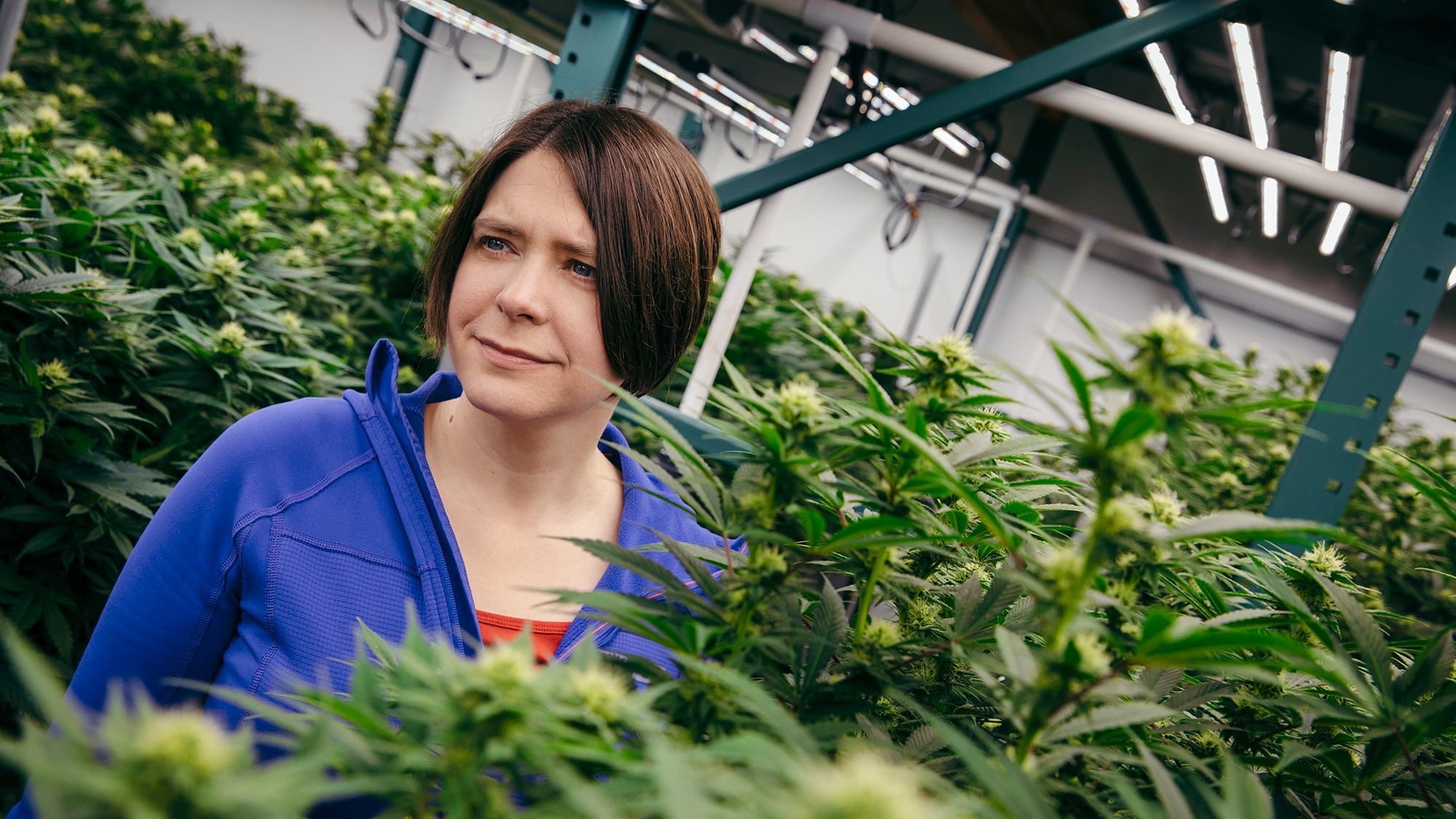Katie Stem might be Portland's most well-rounded mad scientist.
She began as a teenage apprentice at an anatomy lab, preparing cadavers for medical students, and went on to graduate from Carleton College, majoring in premed and literature. Next came a degree in traditional Chinese medicine—she still maintains an acupuncture and herbal medicine practice that she's had since 2010. She's worked in an oncology lab, done behavior neuroscience and memory research, and worked with both pharmaceutical and natural interventions for multiple sclerosis.
Now, Stem is CEO of Peak Extracts, one of Portland's first adult-use edibles producers. Peak products are ubiquitous in Oregon dispensaries, with formulas based on Stem's own research into cannabis medicine—she used pot to help relieve the effects of Crohn's disease—and her experience as a licensed herbalist. Peak's award-winning Rescue Rub, for instance, follows a 2,000-year-old Chinese salve formula Stem uses in her own practice.
"It's all cohesive," she says of her many occupational hats. "It's all people-oriented, it's all healing-oriented, and that's a constant source of nourishment for me."
Above all those other things, Stem is also one of the state's queer business leaders. With Pride Month arriving under obviously strange circumstances, WW spoke to Stem about her LGBTQ+ and female mentorship, gender-biased homophobia and the flimsy misogyny of the cannabis industry.
WW: Before cannabis, you worked in medical research and later Chinese medicine. How did that experience lead you to start Peak Extracts?
Katie Stem: I was really sick in my 20s with Crohn's disease, a treatable, but not curable, chronic progressive disease. There weren't a lot of options for me in terms of intervention with Western medicine. I was already premed, so I took a pause—or what I thought was going to be a pause—and got a degree in Chinese medicine, which was more in line with the natural product research I was doing. Chinese medicine was really working for me. I wanted to learn more about it, so I started a practice and continued to do research on my own time.
The problem with how Crohn's is treated, as I see it, is that you can't really treat more than one problem at once very easily. For instance, when I have a flare, I get a lot of ulcers in my digestive system. There's an open wound in my large intestine, and I'm also bleeding. Western medicine would want to give me prednisone to get my inflammation under control, but you can't really do antibiotics at the same time easily, and you can't really address the bleeding. One of the powers of Chinese herbs is that I can address all those at once. And cannabis is obviously a great anti-inflammatory. It helps with the smooth-muscle spasms that go along with an inflammatory bowel.
What was it like to navigate the medicinal market after your Crohn's diagnosis, and how does that influence the branding and marketing of Peak?
It was entirely based on trial and error at first. Then I was able to home in on a few genotypes that were most useful to me. That's how Peak came up with our color-coding system. What we wanted to do was duplicate what I needed, because I would need a very specific genotype for my symptoms, so we divided them into six different color-coded categories based on effects. It's not about indicas versus sativas—it's more about the genetics, terpene expressions, and the subjective effects they have on your brain and on smooth muscle versus skeletal muscle.
Peak Extracts was the first cannabis company to make the transition from medical to recreational. Was that process harder being a company run by women?
Getting a facility licensed in Portland was an absolute bear. We even had to hire a man to pretend to work for our company! We were stuck with this one inspector who would come in and just say, "Who are you going to get to run this machine?" We'd say, "We've used this machine for three years, we know how to run it," but he wouldn't believe us. So I asked my friend Andrew, an engineer who looks like Erik the Red, to show up 10 minutes before an inspection, cross his giant arms, and stroke his red beard. Just like that, we got passed. It was kind of amazing.
Portland has a long history of progressive ideals in regards to LGBTQ rights and protections. Does that extend to the cannabis industry?
With regard to homophobia, I feel like it's actually been more from women, which has been interesting because there are feminist aspects to the cannabis industry and its politics. In the beginning, we thought, wow, this is a women-run space and we have an opportunity to have all these women-run companies and we're gonna support each other! Then it kind of moved into this aesthetically hyper-feminine, gender-driven space. As a queer company, we felt kind of excluded from that, like we're not pretty or stylish enough to be part of that clique. In a sense, I felt excluded from the women-run companies because we're queer, and I felt excluded from the men-run companies because we're women. We're just in this kind of interesting place in the middle.
What advice would you give to other women and LGBTQIA entrepreneurs starting out in the cannabis industry?
Find some allies. Mentorship is really huge, and I think that's why it's been so hard for women to crack into any industry, especially science, technology and business. Men have built-in mentorship opportunities. Women have to look for them, ask for them, and be explicit about it. Try to seek that out. And make sure you have support from outside the queer community. Like, what would we have done without Andrew? We would have died on that hill. And having people outside of the industry who are female or queer who can go to bat for you is key. There will be so many ways you'll have to interlay with other industries, it's good to have stepping stones.
How is Peak Extracts addressing disparities caused by cannabis prohibition?
We are completely blind to cannabis convictions when hiring, and we are very vocal about it. We don't have a very large team, but as we expand we are trying to be thoughtful. It's crucial moving forward that we try to right some of these wrongs. One of the biggest problems in the cannabis industry right now is that people assume if you have experience running Coca-Cola that you're gonna be great at running a cannabis company. There's just a lot of things that are different about cannabis than any other industry. We should be hiring in as much as possible.
What are you reading in quarantine?
A steady diet of trashy lesbian romance novels.
BUY: Shop Peak Extracts' strain-specific hemp products at peakextracts.com.

